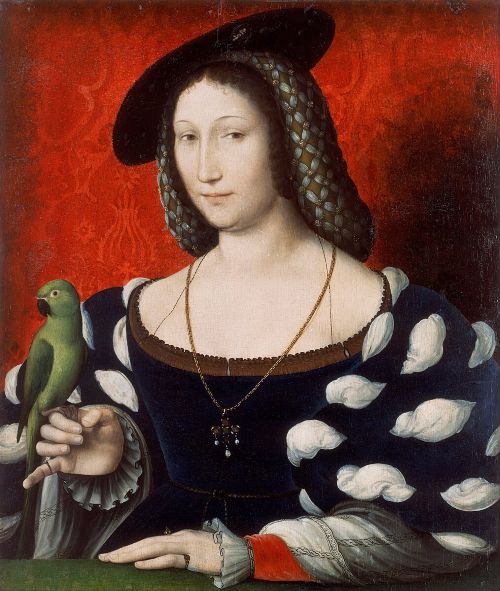Summary | Excerpt | Reviews | Beyond the Book | Read-Alikes | Genres & Themes | Author Bio

A Novel
by Allegra GoodmanThis article relates to Isola
 Allegra Goodman's novel Isola concerns Marguerite de la Rocque de Roberval (born c. 1515), a French noblewoman who was marooned on a deserted island with her lover while on a voyage to New France (Canada). Marguerite was eventually rescued and upon her return to France was treated as a celebrity; her tale became widely known very quickly. Two versions of her ordeal were recorded: one by French priest André Thevet, which is said to be based on an interview with the young lady; and a second gleaned from stories passed around the French court. A romanticized version of this latter account was written down by Queen Marguerite of Navarre (1492-1549), the sister of King Francis I of France and the grandmother of King Henry IV of France. (It's a coincidence that the two women share the same name; who knows, perhaps that's what drew Queen Marguerite's notice in the first place.)
Allegra Goodman's novel Isola concerns Marguerite de la Rocque de Roberval (born c. 1515), a French noblewoman who was marooned on a deserted island with her lover while on a voyage to New France (Canada). Marguerite was eventually rescued and upon her return to France was treated as a celebrity; her tale became widely known very quickly. Two versions of her ordeal were recorded: one by French priest André Thevet, which is said to be based on an interview with the young lady; and a second gleaned from stories passed around the French court. A romanticized version of this latter account was written down by Queen Marguerite of Navarre (1492-1549), the sister of King Francis I of France and the grandmother of King Henry IV of France. (It's a coincidence that the two women share the same name; who knows, perhaps that's what drew Queen Marguerite's notice in the first place.)
Queen Marguerite of Navarre was highly educated and exerted a great deal of influence over her brother's policies. She advocated for the poor and was a strong proponent of the Reformation, often mediating issues between France's Catholics and Protestants. She corresponded with some of the most significant clergymen of the day, including Martin Luther and John Calvin. When Francis began persecuting Protestants at the behest of the Catholic Church, her castle at Navarre became a safe haven and a stopping point on the way to the more liberal Geneva.
Marguerite was also a patron of the arts; her salon, "The New Parnassas," hosted influential scholars. She supported author François Rabelais, poets Clement Marot and Pierre de Ronsard, and artist Leonardo da Vinci after his move to France in 1516.
It's said that Marguerite wrote almost constantly, and over the course of her life she penned short stories, plays, and poems. She often used the latter format to process her grief. Dialogue in the Form of a Nocturnal Vision was written after the deaths of Francis's wife, Claude, and Princess Charlotte, a daughter of Claude and Francis (and Marguerite's favorite of their six children). In the poem, Marguerite communicates with Charlotte's spirit, and grapples with religious faith and mortality.
One of Marguerite's best-known works is Mirror of the Sinful Soul, a poem written after both her infant son Jean and her mother died. Unlike much of Marguerite's work, the poem was published in her lifetime (but because the volume included translations of Psalms by a reformist, it was condemned by the Catholic clergy). Later, she gave a copy to her friend Anne Boleyn, which ultimately found its way to the young Elizabeth Tudor (Elizabeth I), who translated it from French into English.
Marguerite de Navarre's most famous work, The Heptaméron, was meant to rival Boccaccio's The Decameron, and like it, was intended to contain 100 tales. At her death, the work was incomplete. A first version was published in 1558, and over the centuries since, scholars have combed through her manuscripts in attempts to establish an authoritative version. The most recent publication contains 72 stories, including the tale of Marguerite de La Rocque referenced in Isola.
Marguerite imagines the stories being told over a period of ten days by a group of ten travelers — five women and five men — stranded in an abbey by a flood. The Heptaméron focuses on the treatment of women by men, questions of sexual autonomy and virtue, and vice and hypocrisy among clergy, along with other subjects. Unlike in The Decameron, Marguerite's characters are invited to comment on each story after it's told, allowing different interpretations to pepper the narrative. Through this technique, both the narrator and their commentators can be seen as unreliable, and the reader is invited to interpret each tale for themselves.
At the time it was published, The Heptaméron was criticized as vulgar and condemned for its depiction of the Roman Catholic clergy. It gained popularity during the 19th century, however, and remains broadly known and studied. Today, according to an article by Joshua J. Mark, Marguerite de Naverre is widely considered "one of the most significant figures of her time both for her literary achievements and her contributions toward social reform and freedom of religious expression."
Queen Marguerite of Navarre, by Jean Clouet (1480–1541)
Filed under Books and Authors
![]() This article relates to Isola.
It first ran in the April 23, 2025
issue of BookBrowse Recommends.
This article relates to Isola.
It first ran in the April 23, 2025
issue of BookBrowse Recommends.
Your guide toexceptional books
BookBrowse seeks out and recommends the best in contemporary fiction and nonfiction—books that not only engage and entertain but also deepen our understanding of ourselves and the world around us.